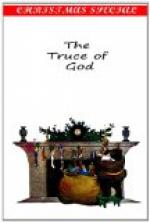The Saxons exulting in their first success, wished to revive the league with Suabia; but first besought the Holy See to indicate which side they should espouse. Gregory’s saintly and heroic reply displays the pure motives by which he was animated in excommunicating the king, and which continued to govern his conduct throughout the contest. He cannot recommend the anathematized monarch to the embraces of the Saxons—nor, on the other hand, does he entirely commend the self-interested zeal of Rodolph. He wishes to humble the king without exalting his adversaries— to reform the empire without a civil war. Had he possessed a particle of the lofty ambition which has sometimes been ascribed to him, this was the moment to attach the Saxons to the Suabian confederacy, and give a death-blow to the Franconian line. But instead of an animated exhortation to arms, in the name of outraged religion, the magnanimous Pontiff writes: “Forget not, I pray you, the frailty of human nature; and remember the piety of his father and his mother, unequalled in our time.” Gregory’s respect for Henry’s parents seems to have inspired him with the charitable hope, which never deserted him, that the king would renounce his vices and return to virtue. It is well to keep this in view, since it is easier, after an inquiry into the struggle between them, to justify the severity than the lenity of the Holy See.
The fifteenth of October had at length arrived, and the eyes of Germany were eagerly directed to Tribur. The left bank of the Rhine was glittering with the chivalry of Upper Germany, and the legions of Suabia were encamped along the bristling river. Here might be seen the swarthy Bohemian, the stern Thuringian rider, the gay Loinhard, and the gigantic Swiss, all mingling together, and apparently indifferent as to where they might be led. Gilbert de Hers felt a new and ardent delight in gazing upon the long and dazzling array of helmets and spears. He longed for the hour when the whole mass would be in motion against a body as beautiful and powerful as itself. With far different feelings did Father Omehr behold the formidable battalia. He knew that the pomp of war, if often sung by poets, is oftener chronicled in hell. In the beautiful language of the age, he had been taught that “Peace is the language of heaven, for Christ, who came from heaven, spoke that language, saying, ‘Pax vobis!’ It is the language of Angels, who cried, exulting, ’In terra pax!’ It is the language of the Apostles, who thus greeted every house they entered: ‘Pax huic domui’” Were the hasty and unscrupulous penmen of our generation to draw their information from the writings of the Saints, instead of from martial legends or miserable perversions even of these, they would find the spirit of the Ages of Faith eminently pacific, and could be induced so to represent it. At least, the Church, the teacher and the regenerator of Europe, breathed nothing but “Peace!” Many holy doctors went so far as to condemn hunting, as being calculated to make men love war. And even the war-cry of the red-crossed knights was: “Mansuetudinem quaerimus et non bella!”




